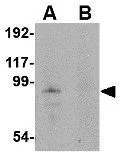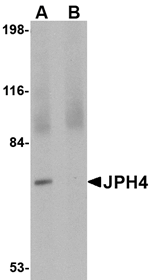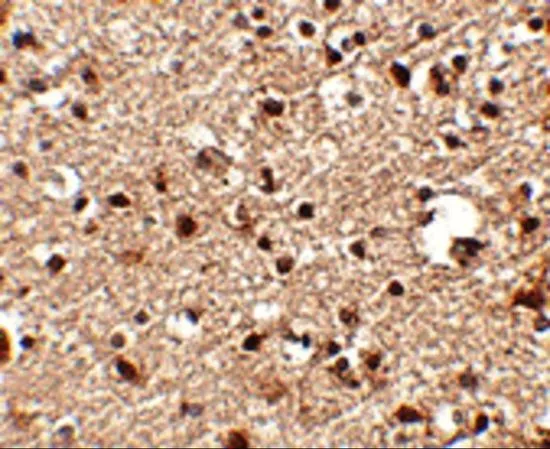
WB analysis of mouse brain tissue lysate in (A) the absence and (B) the presence of blocking peptide using GTX85362 JPH4 antibody. Working concentration : 1 μg/ml
JPH4 antibody
GTX85362
ApplicationsWestern Blot, ELISA
Product group Antibodies
ReactivityHuman, Mouse, Rat
TargetJPH4
Overview
- SupplierGeneTex
- Product NameJPH4 antibody
- Delivery Days Customer9
- Application Supplier NoteWB: 1 microg/mL. *Optimal dilutions/concentrations should be determined by the researcher.Not tested in other applications.
- ApplicationsWestern Blot, ELISA
- CertificationResearch Use Only
- ClonalityPolyclonal
- Concentration1 mg/ml
- ConjugateUnconjugated
- Gene ID84502
- Target nameJPH4
- Target descriptionjunctophilin 4
- Target synonymsJP4, JPHL1, junctophilin-4, JP-4, junctophilin like 1, junctophilin-like 1 protein
- HostRabbit
- IsotypeIgG
- Protein IDQ96JJ6
- Protein NameJunctophilin-4
- Scientific DescriptionJunctional complexes between the plasma membrane (PM) and endoplasmic/sarcoplasmic reticulum (ER/SR) are a common feature of all excitable cell types and mediate cross talk between cell surface and intracellular ion channels. Junctophilins (JPs) are important components of the junctional complexes. JPs are composed of a carboxy-terminal hydrophobic segment spanning the ER/SR membrane and a remaining cytoplasmic domain that shows specific affinity for the PM. Four JPs have been identified as tissue-specific subtypes derived from different genes: JPH1 is expressed in skeletal muscle, JPH2 is detected throughout all muscle cell types, and JPH3 and JPH4 are predominantly expressed in the brain. In the CNS, both JPH3 and JPH4 are expressed throughout neural sites and contribute to the subsurface cistern formation in neurons. Mice lacking both JPH3 and JPH4 subtypes exhibit serious symptoms such as impaired learning and memory and are accompanied by abnormal nervous functions.
- ReactivityHuman, Mouse, Rat
- Storage Instruction-20°C or -80°C,2°C to 8°C
- UNSPSC41116161





